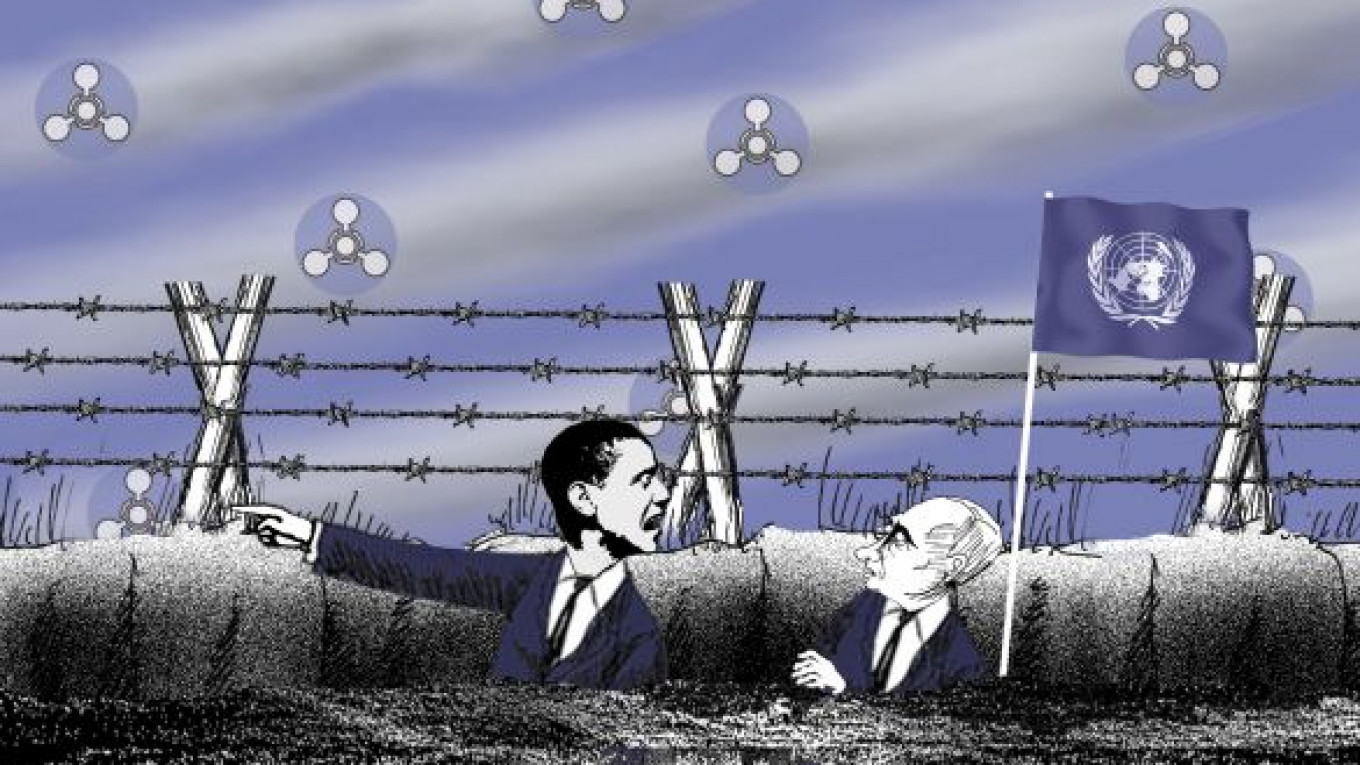On Monday, Foreign Minister Sergei Lavrov acknowledged that the U.S. had submitted evidence that the army of Syrian President Bashar Assad had used chemical weapons but said the classified documents were "absolutely unconvincing."? I would add that Russia will never be convinced because the Kremlin has already stated its position: It was the rebels who used chemical weapons near Damascus and suggesing otherwise is "utter nonsense."
Indeed, could Washington have produced anything "more convincing" than the results of laboratory analyses of chemical substances, the testimonies of doctors and victims affected by the substances, video material and intercepted conversations between Syrian generals saying they had overdone it with the chemicals and that they should bomb sites to eliminate the traces of deadly chemicals? Of course not. It would be physically impossible to provide any other evidence in such a situation.
On Monday, Foreign Minister Sergei Lavrov acknowledged that the U.S. had submitted evidence that the army of Syrian President Bashar Assad had used chemical weapons but said the classified documents were "absolutely unconvincing."
Consequently, this boils down to a question of trust: "If I want to believe it, I will. If I don't want to, I won't." In September 2001, the Kremlin was much quicker to believe the United States' even scantier evidence of intercepted conversations indicating that al-Qaida was behind the attacks on the twin towers and Pentagon. And yet the Kremlin displayed far greater trust in Washington then, and far more importantly, greater interest in working with the U.S. to combat terrorism and end Taliban rule in Afghanistan. Obviously, statements about "believing" or "not believing" are only a cover for underlying political interests.
This episode confirms that, from now on, Moscow will work to ensure the survival of Assad's regime and has cast aside such earlier statements as, "We are not for Assad or for the opposition, but for the Syrian people." The Kremlin apparently fears that a U.S. missile attack will eventually succeed in toppling the Assad regime and Russia's policy of support along with it. Meanwhile, Obama has backed both himself and the U.S. into a corner by having threatened action if Syria were to cross a "red line." But both Washington and Moscow are hostages to the UN Charter that obligates the Security Council to take strong measures if weapons of mass destruction are used. Obama is attempting to take measures, but half-heartedly, trying to cover his rear from criticism by both the "peace-loving public" and congressional Republicans who accuse him of "diminishing America's leadership in the world." Obama is clearly taking a time-out in the hope that the situation will resolve itself or evaporate like the sarin gas Assad allegedly used against Syrian civilians.
It is doubtful that this short pause will save Obama. He will probably have to carry through with his plans, and do so outside of the framework of the UN Security Council. He will most likely have to base his actions on the UN General Assembly's Responsibility to Protect doctrine, which in 2005 established that world powers can protect the civilian population of a country where internal conflict threatens the massive loss of life at the hands of rulers.
Washington is afraid of becoming embroiled in the Syrian civil war, and Moscow is afraid of losing everything. Thus, all statements about "believing" or "not believing" are about as relevant here as a pack of tarot cards.
Many people argue that Washington's serious gaffe in claiming that former Iraqi leader Saddam Hussein held weapons of mass destruction has seriously undermined its credibility in presenting "evidence" against Assad today. Note that back in 2003, the evidence against Iraq that U.S. Secretary of State Colin Powell presented to the U.N. Security Council was more an effort to mobilize U.S. public opinion than a justification for invasion. And it was not the desire for Iraqi oil that motivated Washington, although that oil became important later, when contracts were distributed between the giants of many nations, including Russian LUKoil, rather than seized by the Americans alone.
Recall that Saddam Hussein himself was trying to convince his enemies that he had considerable reserves of various weapons of mass destruction and that he was also developing his nuclear program. Even many Iraqi generals were convinced of the truth of such statements. But Hussein's regime was toppled because of his gross violation of practically every major Security Council resolution calling on Iraq to halt its nuclear program. What's more, each of those resolutions authorized the use of military force if Baghdad refused to cooperate with UN inspectors.
Then-U.S. Senator Barack Obama spoke out against the weak evidence underlying the U.S. invasion of Iraq, but today the situation is radically different. That very same pacifist Barack Obama sits at the helm in Washington and weapons of mass destruction have undoubtedly been used in Syria. In fact, this is not the first use of such weapons there, but only the first of such scale. The U.S. and Europe are absolutely certain that Assad's army is responsible for the attack. The UN Charter requires concrete action, but, as happened in 2003, the Security Council is paralyzed and doomed to inaction. That lack of resolve not only tacitly endorses the crime, but encourages its repetition in the future. As happened with regard to Iraq, it is once again necessary to bypass the increasingly irrelevant Security Council and form a "coalition of the willing" among countries that are prepared to act. Apparently, that approach is, of necessity, becoming the norm in international affairs today. To put it simply, farewell, Security Council.
Alexander Shumilin is the? director of? the Center for? the Analysis of? Middle East Conflicts with the? Institute for? U.S. and? Canadian Studies at? the Russian Academy of? Sciences.


